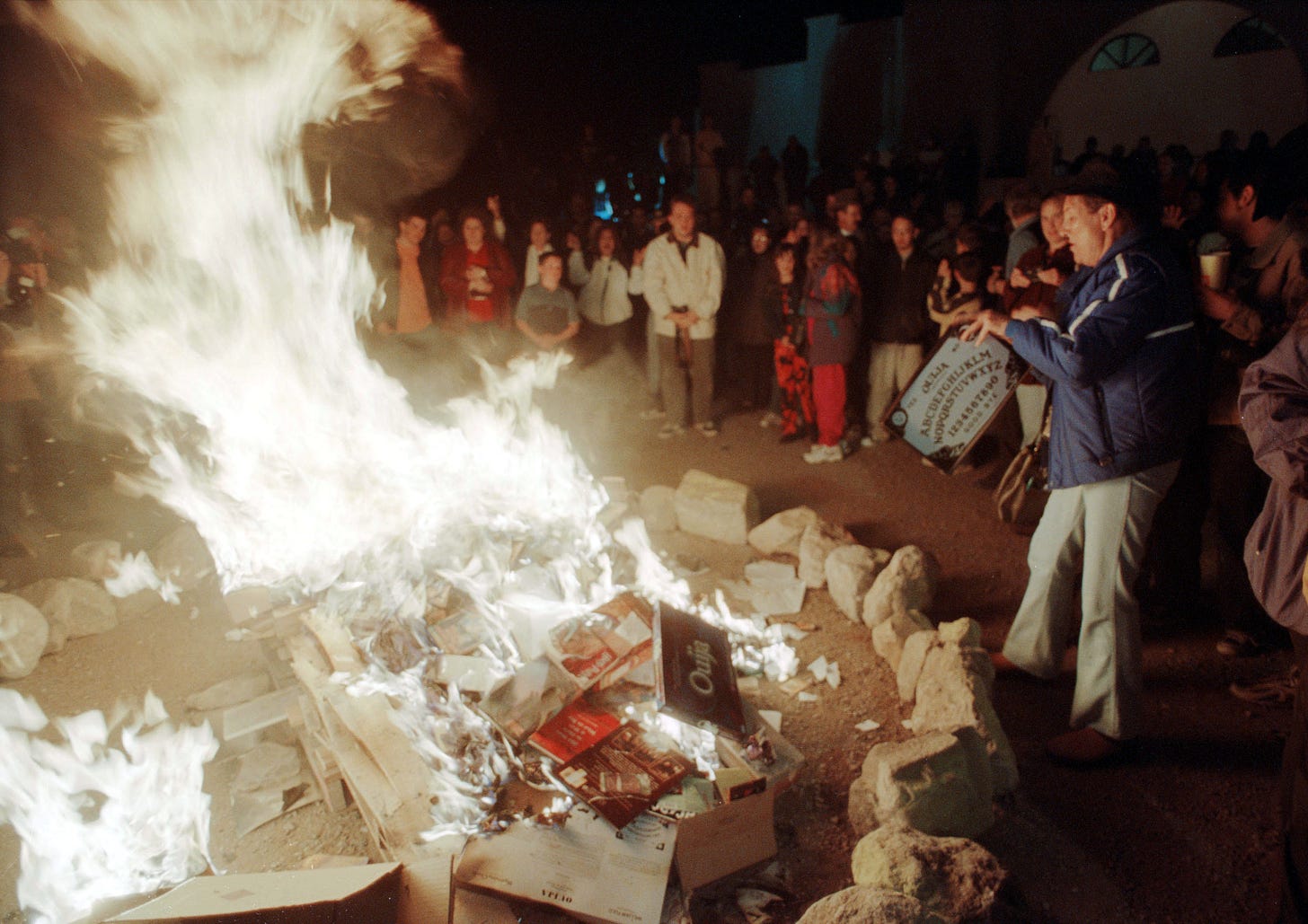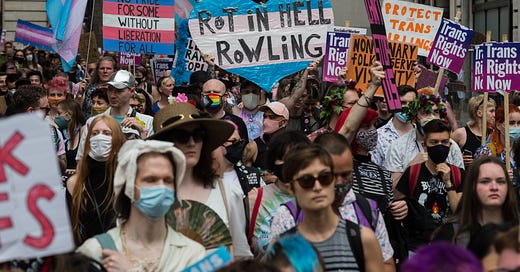
J.K. Rowling is arguably the most successful author in the history of publishing, with the possible exception of God. And Harry Potter was a kind of bible for my generation. Since its publication beginning in the late ’90s, the series has taught tens of millions of children about virtues like loyalty, courage, and love—about the inclusion of outsiders and the celebration of difference. The books illustrated the idea of moral complexity, how a person who may at first appear sinister can turn out to be a hero after all.
The author herself became part of the legend, too. A broke, abused, and depressed single mother—writing in longhand at cafes across Edinburgh while her baby girl slept in a stroller beside her—she had spun a tale that begat a global phenomenon. If Harry Potter was a bible, then Rowling became a kind of saint.
When she gave the Harvard commencement address in 2008, she was introduced as a social, moral, and political inspiration. Her speech that day was partly about imagination: “the power that enables us to empathize with humans whose experiences we have never shared.”
“We do not need magic to transform our world,” Rowling told the rapt audience. “We carry all the power we need inside ourselves already.”
The uproarious applause that greeted her in 2008 is hard to imagine today. It’s hard to imagine Harvard—let alone any prestigious American university—welcoming Rowling. Indeed, I’m not sure she’d be allowed to give a reading at many local libraries.
That’s because to many, Rowling has since become a kind of Voldemort—the villain of villains in her own stories.
It all blew up in the summer of 2020.
“‘People who menstruate,’” Rowling wrote on Twitter, quoting a headline. “I’m sure there used to be a word for those people. Someone help me out. Wumben? Wimpund? Woomud?”
She continued: “If sex isn’t real, there’s no same-sex attraction. If sex isn’t real, the lived reality of women globally is erased. I know and love trans people, but erasing the concept of sex removes the ability of many to meaningfully discuss their lives. It isn’t hate to speak the truth.”
It’s hard to capture the breadth of the firestorm that followed.
Rowling’s words led to a “revolt” among the staff at one of her publishers, an outcry from some of her most ardent fans, and a torrent of negative headlines in news outlets around the globe. Actors who had grown up on the Harry Potter film sets—people she had known since they were children—distanced themselves from her. Many of Rowling’s former fans began calling for boycotts. They removed photos of her from their websites and Potter tattoos from their bodies. TikTokers started a trend of covering her name on books and book jackets, and tore her books apart. Players of Quidditch—the fictional sport she invented—ultimately changed its name to dissociate themselves from her. The abhorrence of Rowling has at times been so intense that it’s led to the actual burning of her books. A recent novel even includes a scene where Rowling herself is killed in a fire.
In response to a flood of calls for her to apologize, Rowling refused to back down.
Instead, she published an essay on sex and gender issues, including an account of her violently abusive ex-husband. She said she was writing “out of solidarity with the huge numbers of women who have histories like mine, who’ve been slurred as bigots for having concerns around single-sex spaces.”
For many, Rowling’s clarifications didn’t help. They only further cemented her transformation from a progressive hero into a hateful reactionary. The head of the biggest Potter fansite in the world said she was “heartbroken” and shared a guide on “cancelling” Rowling, while others accused the author of “destroying her legacy.”
This wasn’t the first time that Rowling had been the object of intense backlash.

In the late 1990s and early 2000s, many Christians saw her stories of witchcraft as dangerous for children, both sinful and poisonous. They made films and wrote books decrying her influence, sermonized against her, and campaigned to have her work removed from schools and libraries. Their efforts to censor the series made Harry Potter among the most banned books of two different decades. Some of these Christians, too, burned her books.
The longer I watched the current controversy unfold, the more I wanted to understand: How did the people in these conflicts view what was happening? How did Rowling understand herself and her critics, past and present—and vice versa? Why had she chosen this hill to die on? And how had the conversation devolved so fully that it didn’t seem possible to have a productive conversation at all?
So, like millions of Harry Potter readers before me, I wrote J.K. Rowling a letter. It was a request to interview her—to have a conversation about where she was coming from. And I explained to her why I might be the right person to do it.
I was born into the Westboro Baptist Church, a tiny congregation founded by my grandfather that was a world unto itself. From the age of five, I protested with my parents, siblings, and extended family on sidewalks across America—including outside the funerals of AIDS victims and American soldiers. We held signs with messages like “God Hates Fags,” and earnestly believed we were doing the Lord’s work—that our protests were an expression of love, warning the world from sins that would do them harm.
As I grew up, I became a zealous believer in Westboro’s doctrines. I spent my days on the receiving end of a tidal wave of hatred and disgust, as I happily warned the world that they were bound for Hell if they didn’t change their ways. But when I took the church’s message to Twitter in my mid-twenties, I encountered strangers who—through kindness, friendly mockery, and civil conversation—helped me see that it was me who needed to change.
Ten years ago, at age 26, I left the church and lost all of my family who stayed behind. Those strangers from Twitter became some of my dearest friends—among them, the man I would eventually marry, the father of my two children.
Like Rowling, I knew what it was like to be an object of intense hatred. But I also knew the value of good-faith conversation, and the role it can play in bridging even the deepest divides.
To my surprise, Rowling responded to my letter. It turned out she was already familiar with my story, having read my memoir when she received it as a gift.
And so, last summer, I headed to Scotland.
Rowling was ready for the conversation I had suggested—and she had many things to discuss. Her experience of escaping a physically and psychologically abusive marriage. The origin story of Harry Potter, and its relevance to the conflict Rowling is embroiled in today. And the details of how—and why—she came to drop a “hand grenade into Twitter” with her tweets in 2020.
Rowling told me that she took that step with full knowledge of the magnitude of the backlash her statements would cause.
“I never set out to upset anyone,” she told me. “However, I was not uncomfortable with getting off my pedestal.” Of the fans who accused Rowling of “ruining her legacy,” the author said: “You could not have misunderstood me more profoundly.”
But the story of J.K. Rowling is not just the story of one author, or one woman, or one issue. It is a microcosm of our time. It’s about the polarization of public opinion and the fracturing of public conversation. It’s about the chasm between what people say they believe and how they’re understood by others. It’s about what it means to be human—to be a social animal who feels compelled to be part of a tribe. And it’s about the struggle to discern what is right when our individual view of the world is necessarily limited and imperfect.
I’ve spent the better part of the past year speaking with people on all sides of this conflict: trans adults, teens, clinicians, and advocates; historians, reporters, authors; Christians who boycotted Potter in the 1990s; doctors, lawyers, and even experts on witch trials. I also sat down with Rowling in her Edinburgh home over the course of several days.
These topics are beyond fraught, and I’m grateful to those who were gracious enough to be open and vulnerable with me—often on the most sensitive of subjects. Regardless of where they stood on the issues, many of the people I spoke with expressed similar concerns about going on the record: the waves of personal attacks that seem to come for anyone who speaks up; the fear that listeners would take them out of context; that they would lose their friends, family, career, safety; that their reputations would be destroyed.
I am not immune to these fears. And yet, I remain a believer in the power of conversation. The ones I had for this series challenged my assumptions and showed me that this conflict is even more complex than I had imagined. I don’t pretend to have answers to the deep questions at the heart of this series. But I’m more persuaded than ever that talking—and listening—will help us find the path forward.
Subscribe to The Witch Trials of J.K. Rowling and listen to the trailer here.
The Witch Trials of J.K. Rowling will begin on Tuesday, February 21, everywhere podcasts are available.
If you have questions or thoughts you’d like to share, we’d love to hear from you. You can send us an email at witchtrials@thefp.com.




Growing up as a (closeted at the time) gay kid in the suburbs, the Harry Potter books transported me to another world, one where I didn’t have to feel alone, where as Rowling said of her own books “by page or by screen, Hogwarts will always be there to welcome you home”. So many of my LGBTQ+ friends (Trans included) felt so seen by these books growing up - there was something about Potter that really resonated with the idea of being the outsider, etc. Rowling has done so much good for the world, especially for so many children with her various charities like Lumos (she is the first UK Billionaire to lose Billionaire status from donating so much to charity) and now that everyone is boycotting her, do they even realize so much of her money actually goes to supporting incredible causes? Very excited to check out this podcast, and still a huge Potter fan to this day, as it saved my life as a kid, and countless others
Harry Potter came out when I was in my twenties. I used to see people on the T in Boston reading it all the time and thought, “I can’t believe these adults are reading a children’s book. They need to get a life.”
Now I have children and have read the entire series and realize how wrong I was. As noted in the article, if you want your kids to learn about the qualities that make for a good person, read Harry Potter (and the James Harriot series). JK Rowling is an inspiration.
The thing that bothers me the most are the ungrateful assholes who starred in the movies and now try and distance themselves from Rowling. They only reason anyone know who the hell you are is because of Rowling. You should have shrines set up to her in all of your houses.
Fun fact- did you know Emma Watson loves children so much she sits on the board of the parent company of Balenciaga? Big fan of kids she is...